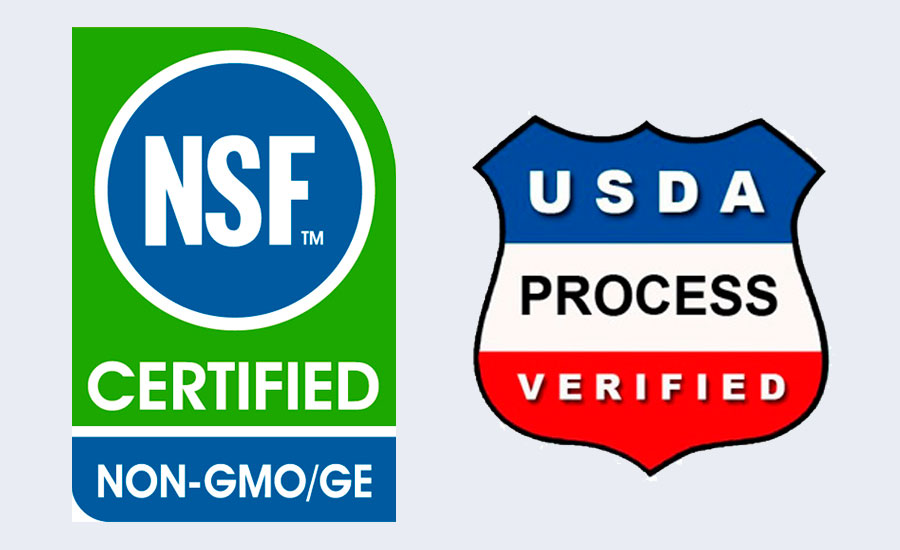As demand for non-GMO foods grows, new players are entering the non-GMO certification market. In May, the US Department of Agriculture announced that non-GMO grain supplier SunOpta had achieved non-GMO process certification through the USDA’s Process Verified Program. More recently, international standard development organization NSF launched its Non-GMO True North certification program. Meanwhile, some organic certifiers are extending their organic claims to include non-GMO with labels that say “Organic is Non-GMO and More.”
The Non-GMO Project remains the most widely accepted non-GMO verification program in the US. To date, there are 35,000 food products from 2000 brands that are Non-GMO Project verified.
NSF True North™ program
NSF launched its Non-GMO True North program in response to requests from food manufacturers, retailers, and consumers who want more options to meet the growing demand for non-GMO products, says Jaclyn Bowen, director of NSF International’s Consumer Values Verified Program.
“With 70 years’ experience in developing standards, it was a natural progression for us to develop market solutions for these stakeholders,” she said.
As with the Non-GMO Project, NSF’s True North program has a non-GMO standard with requirements for traceability, segregation, and GMO testing. Companies must meet a 0.9% GMO threshold for finished products, which is the EU threshold for GMO labeling and is increasingly recognized as a standard GMO threshold by food and grain companies. There is also a 5% GMO threshold for animal feed.
Non-GMO True North certification also utilizes elements of global and domestic GMO labeling regulations, including EU and Vermont GMO labeling requirements. It requires risk assessment-based unannounced audits and unannounced chain of custody sampling. True North certification also gives credit for food safety quality system best practices including segregation, traceability, and supplier approval and monitoring programs.
Bowen describes NSF’s Non-GMO True North as an expansion in non-GMO certification services.
“As consumer demands for non-GMO products grow, NSF Non-GMO True North offers producers (including ranchers and farmers), processors and manufacturers a solution that utilizes fundamentals of other current and emerging regulatory and food safety requirements,” she said.
NSF is also a technical administrator for the Non-GMO Project and can verify products to the Project’s non-GMO standard.
USDA non-GMO verification, DARK Act non-GMO certification
Meanwhile, the USDA’s Process Verified Program (PVP) for non-GMO products has no standard or definition for what is non-GMO, according to Steve Ross, manager of field operations for USDA’s Agricultural Marketing Service (AMS).
“It’s not a regulatory program, it’s not a label approval process, and it’s not a standard,” Ross says. “It’s a quality management program and verifies a company’s own (non-GMO) requirements.”
Ross worked with SunOpta on their non-GMO process verification after the company approached AMS in 2013 about a non-GMO program. SunOpta developed a quality management system based on the PVP program. SunOpta finished its verification in 2015 and can market its soybeans as meeting a threshold of 99.1% non-GMO purity. AMS will audit SunOpta each year to verify that they are continuing to meet their non-GMO requirements.
Meanwhile, federal legislation related to GMO labeling contains a mandate for the USDA to create a national non-GMO certification program. The legislation, H.R.1599, popularly known as the DARK (Deny Americans the Right to Know) Act, has passed the House of Representatives, and a companion bill is may be introduced into the Senate this fall.
Non-GMO Project executive director Megan Westgate, recently told FoodNavigator USA that the proposed USDA non-GMO certification program “would confuse consumers and operate to drastically lower standards than the Non-GMO Project.”
“Organic is Non-GMO and More” label
Organic certifiers are recognizing the importance of non-GMO claims by creating labels that say “Organic is Non-GMO & More.” CCOF and the Ohio Ecological Food and Farm Association have both introduced the labels.
According to CCOF, the seal was created to support its certified members and to better communicate the benefits of organic to consumers. Organic food production encompasses more than non-GMO assurance with enhancing soil health and biodiversity, supporting animal welfare, and producing foods without synthetic fertilizers or toxic pesticides.
Foods bearing CCOF’s “Organic is Non-GMO & More” label are starting to appear in national grocery stores including Costco and Whole Foods.
Lundberg Family Farms has added the new seal to seven of their products so far, with at least another seven hitting the market in 2016.
Hodo Soy also started using the seal on their packaging to educate their customers. Hodo Soy’s regional account specialist Henry Hsu says, “We find that consumers have been confused with what USDA Organic means or what certified organic entails, so when CCOF offered this new logo, we immediately decided that we wanted to have this information on our packaging. It helps to clarify [the meaning of organic] and educate our customers for us, and we’re happy to have the additional help.”





